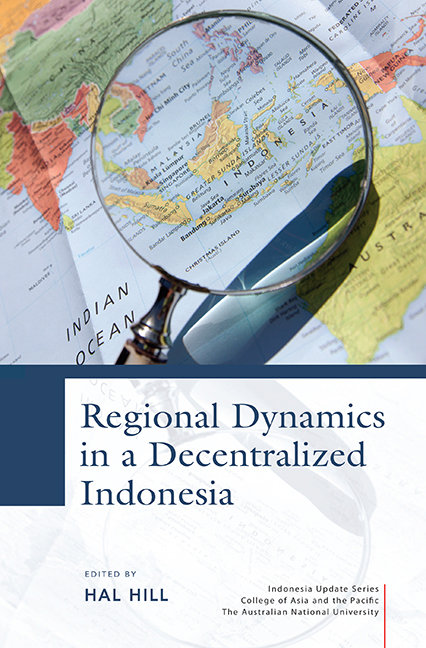Book contents
- Frontmatter
- Dedication
- Contents
- Tables
- Figures
- Contributors
- Acknowledgments
- Glossary
- Map of Indonesia
- 1 An introduction to the issues
- PART 1 HISTORICAL, ECONOMIC, POLITICAL AND SOCIAL PATTERNS
- PART 2 DECENTRALIZATION AND GOVERNANCE
- PART 3 LOCAL-LEVEL PERSPECTIVES
- PART 4 MIGRATION, CITIES AND CONNECTIVITY
- 13 Migration patterns: people on the move
- 14 Regional labour markets in 2002–12: limited convergence but integration nonetheless
- 15 The dynamics of Jabodetabek development: the challenge of urban governance
- 16 Challenges of implementing logistics reform in Indonesia
- PART 5 CHALLENGES FOR INDONESIA'S PERIPHERY
- Author index
- Subject index
- INDONESIA UPDATE SERIES
16 - Challenges of implementing logistics reform in Indonesia
from PART 4 - MIGRATION, CITIES AND CONNECTIVITY
Published online by Cambridge University Press: 21 October 2015
- Frontmatter
- Dedication
- Contents
- Tables
- Figures
- Contributors
- Acknowledgments
- Glossary
- Map of Indonesia
- 1 An introduction to the issues
- PART 1 HISTORICAL, ECONOMIC, POLITICAL AND SOCIAL PATTERNS
- PART 2 DECENTRALIZATION AND GOVERNANCE
- PART 3 LOCAL-LEVEL PERSPECTIVES
- PART 4 MIGRATION, CITIES AND CONNECTIVITY
- 13 Migration patterns: people on the move
- 14 Regional labour markets in 2002–12: limited convergence but integration nonetheless
- 15 The dynamics of Jabodetabek development: the challenge of urban governance
- 16 Challenges of implementing logistics reform in Indonesia
- PART 5 CHALLENGES FOR INDONESIA'S PERIPHERY
- Author index
- Subject index
- INDONESIA UPDATE SERIES
Summary
INTRODUCTION
The rural hinterlands of Medan in North Sumatra and Pontianak in West Kalimantan are known for growing lots of oranges. You can find oranges from those areas in supermarkets in Jakarta and Surabaya, although their market share is limited because of strong competition from countries such as China. The main reason for this is that trade logistics costs in Indonesia are high – so high that it is cheaper to ship oranges to Jakarta from China (and even the United States) than from Medan and Pontianak. The cost of shipping a container from China to Jakarta is about $400, but as much as $600 from Pontianak. A study by the World Bank (2010) found that 70 per cent of the difference in the prices of staple agricultural commodities across the Indonesian archipelago was explained by a region's degree of remoteness. Essentially this reflects the poor state of logistics, especially the low quality of transport infrastructure. The distance from the large industrial estates in Cikarang in West Java to the port of Tanjung Priok in Jakarta, and from the industrial estates in Pasir Gudang to the port of Tanjung Pelepas in Malaysia, is more or less the same: about 55 kilometres. However, there is a substantial difference in the cost of transporting containers from these areas to the ports. In Indonesia, it costs about $750 to transport a container from Cikarang to Tanjung Priok, but in Malaysia it costs only $450 to transport a container from Pasir Gudang to Tanjung Pelepas.
The Indonesian government recognizes the importance of efficient transport networks to promote inclusive economic development. As a huge archipelago, the country depends on efficient, affordable and reliable shipping services to glue the nation together. Seeing itself more and more as a ‘maritime economy’, Indonesia has prepared both a Shipping Law and a Port Master Plan in recent years. The importance of toll roads and highways to bring down land transport costs has also been recognized. For example, when the toll road between Surabaya and Jakarta is finished, it is estimated that travel time between the two cities will fall from 18 to eight hours.
In recent years, the issue of logistics has attracted increased attention.
- Type
- Chapter
- Information
- Regional Dynamics in a Decentralized Indonesia , pp. 386 - 406Publisher: ISEAS–Yusof Ishak InstitutePrint publication year: 2014

